

How to Prioritize Work: 7 Practical Methods for When "Everything is Important" One of the biggest struggles in the modern workplace is knowing how to prioritize work.
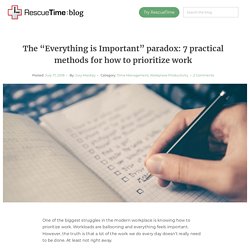
Workloads are ballooning and everything feels important. However, the truth is that a lot of the work we do every day doesn’t really need to be done. At least not right away. Learning how to prioritize means getting more out of the limited time you have each day. It’s one of the cornerstones of productivity and once you know how to properly prioritize, it can help with everything from your time management to work life balance. But while the elements of prioritization are simple (i.e. To make things easier, we’ve collected some of the best strategies out there on how to prioritize work into one master list. RescueTime tells you exactly how you’re spending your time every day so you can prioritize the work that matters most. 1. Prioritization happens on different levels. Unfortunately, those lists don’t always match up. However, when setting your priorities, try not to get too “task oriented”. 2. 3. 4. How to Think.
When I applied for my faculty job at the MIT Media Lab, I had to write a teaching statement.
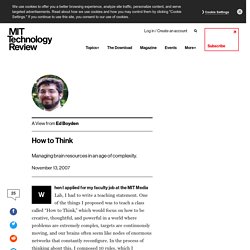
One of the things I proposed was to teach a class called “How to Think,” which would focus on how to be creative, thoughtful, and powerful in a world where problems are extremely complex, targets are continuously moving, and our brains often seem like nodes of enormous networks that constantly reconfigure. In the process of thinking about this, I composed 10 rules, which I sometimes share with students. I’ve listed them here, followed by some practical advice on implementation. 1.
Synthesize new ideas constantly. Research Shows a Simple Way to Increase Your Engagement at Work. The Weekly Planning Method For People Who Totally Hate Planning. I coach CEOs, executives, HR managers, doctors, lawyers, and tech consultants–all busy people, many of whom can’t stand planning. But you won’t find me brushing up on Japanese business philosophy or fiddling with century-old planning templates in order to help my clients out.
I’ve found that daily planning from a weekly action list is all it takes to keep them on track for the long haul. This “hebdomadal” model (feel free to Google that!) Is the simplest form of long-term planning–meaning even people who hate long-term planning can usually manage to stick with it. If you spend enough time masterminding your weekly action plan, usually 10-30 minutes, you can condense bigger goals into doable directives that can be accomplished on a day-to-day basis, while still having a clear sense of the ground you’ll have covered by this time next week. Productivity. I think I am at least somewhat more productive than average, and people sometimes ask me for productivity tips.
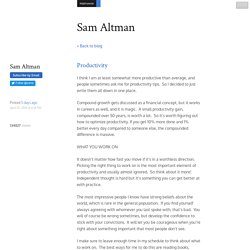
So I decided to just write them all down in one place. Compound growth gets discussed as a financial concept, but it works in careers as well, and it is magic. A small productivity gain, compounded over 50 years, is worth a lot. So it’s worth figuring out how to optimize productivity. If you get 10% more done and 1% better every day compared to someone else, the compounded difference is massive. How I Reduced Stress, Increased Productivity, and Made Myself Happy Again. Replace Your To-Do List With Interstitial Journaling To Increase Productivity. Environment Design: An Incredibly Powerful Productivity Tool. Peter Drucker: The Rules of Effectiveness – Personal Growth. When Peter Drucker was asked to participate in a study of geniuses, he politely declined.

A famous happiness and creativity researcher was in the process of writing a book on the commonalities of people who had achieved culture-disrupting success in their domain. The final study included 91 participants from different fields, including 14 Nobel Prize winners. When Drucker received the invitation to participate, however, he simply said that one of the reasons for his accomplishments was that he was very deliberate about where his time went. As fascinating as such a study would be, it would mean that he would have to interrupt his own schedule to do something that didn’t align with his creative goals and personal objectives. It makes sense, too. Long before the modern productivity movement, Drucker laid out his own ideas about what it means to get the most out of yourself. Being effective is about successfully aligning behavior with your intentions. 1. 2. In his own words: 3. Why Calendars are More Effective Than To Do Lists – The Mission.
If there’s one pattern I’ve come across in dozens of articles, books I’ve read, and the 100’s of people that I’ve interviewed, it’s that the most prolific, productive and successful ones don’t depend on to-do lists, they depend on a calendar.
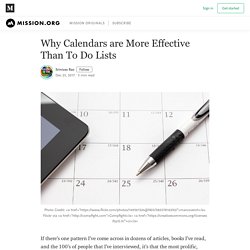
It’s a lesson I’ve learned over and over again in my own work. The likelihood of me getting anything done goes up significantly when I put something on the calendar. Our lives are dictated almost entirely by units of time: Productivity is dangerous. My personal rule is that if you aren’t quite certain that a certain action will be good for you and the world, you shouldn’t do it.
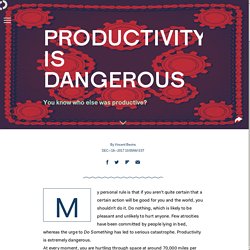
Do nothing, which is likely to be pleasant and unlikely to hurt anyone. Few atrocities have been committed by people lying in bed, whereas the urge to Do Something has led to serious catastrophe. Productivity is extremely dangerous. At every moment, you are hurtling through space at around 70,000 miles per hour, while also rotating along with the rest of the Earth’s surface at a speed of a thousand miles per hour. You’re filling your lungs with air, over and over, and as long as you’ve eaten recently, blood is taking nutrition to every part of your body and creating it anew. The marshmallow method: a new technique to increase productivity. What is a marshmallow moment?

At Stanford University, in the 1960s and 1970s, a psychologist named Walter Mischel led an experiment called the Marshmallow Test. The test was as follows. A child was placed in a room alone. On a plate in front of the child, the psychologist placed one marshmallow. How to Improve Concentration for Success - InnerConqueror. Many people have observed me crushing it throughout the day and have asked me how I get so much work done.

They want to know my strategies on how to improve concentration. Before we begin I want to give you a heads-up: This is a pretty long blog post! If you’re short on time and want this valuable information fast … Click here to grab The Best Daily Habits for Improving Concentration cheatsheet! (Free PDF Download) The Productive Benefits of Journaling (plus 11 ideas for making the habit stick)
The Hacker News Generation (Afraid of Hard Work) - Simple Programmer. Use This Formula To Overhaul Your Totally Worthless To-Do List. More Productivity Myths, Debunked by Science (and Common Sense) Don't set goals for yourself—instead, create systems that make it easy for you to succeed — Quartz. A lot of my friends are spending the month of January “going dry” or giving up sugar or training for marathons.

I can relate. As a Type-A, goal-oriented masochist, I tend to make deeply ambitious New Year’s resolutions each year. Witness Exhibit A: My resolutions from 2016. A Way to Plan If You’re Bad at Planning. Executive Summary Learning how to plan — especially if you’re new to organizing your time — can be a frustrating experience.
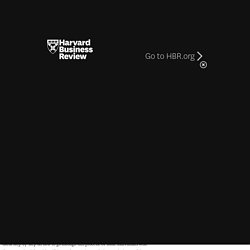
And for some individuals, the reason could be their brains. Those with natural brain dominance in the back-left part of the brain are most comfortable making linear plans and following them. But those with brain dominance in a different quadrant of their brain will find planning much harder. Lifehac. 9 Habits You Need to Stop Now. Rather than read all of these self-help books full of things you should start doing to be more productive, it’s often better to look at what you should stop doing that gets in the way of productivity. Looking at a problem backwards is called inversion and it’s often a better approach. With that in mind, Tim Ferriss, the author of The Four Hour Workweek, recently talked about this in a short podcast on productivity tricks. Here is Tim’s list of nine things you should stop doing right now. 1. Do not answer phone calls from people you don’t know. Freelancer Time Management Systems. "The Master does nothing, yet he leaves nothing undone.
The ordinary man is always doing things, yet many more are left to be done. "-- Tao Te Ching Sometimes I wish I was a vampire, or at least a werewolf. It would probably make this whole work-life balance thing people talk about easier. But unfortunately, I’m only human, which means I have to sleep, and I only get 24 hours per day, just like everyone else. Why Having a System is Essential to Increasing Your Creative Output. One of the patterns you’ll likely notice if you study nearly every prolific creator is that they utilize systems. Mason Curry’s book Daily Rituals also explores some of the systems used by creators throughout history. James Clear utilizes a system of 2 articles a week for his writingSeth Godin’s system is to publish a piece every single dayIn David Kadavy’s recent post about how he increased his creative output, he might not have explicitly stated it.
But he’s using a system.My personal system for the better part of the last few years has been 1000 words a day combined with this 8-step daily routine Having a system results in habitual rather sporadic creativity. Systems vs Goals My problem with goals is that they are limiting. Making a Change: One Small Step. “A journey of a thousand miles must begin with the first step.” — Lao Tzu Change is hard. The Japanese philosophy of Kaizen offers an effective, manageable way to achieve long-term goals — Quartz. “Compounding is the greatest mathematical discovery of all time.” — Albert Einstein. Why time management is ruining our lives. The eternal human struggle to live meaningfully in the face of inevitable death entered its newest phase one Monday in the summer of 2007, when employees of Google gathered to hear a talk by a writer and self-avowed geek named Merlin Mann.
The Sanctity of Your Calendar – The Year of the Looking Glass – Medium. This Is How To Be Productive Without Being Miserable: 8 Proven Secrets. How to Think. 11 Best Productivity Tips for Working From Home. This Is How To Be Productive: 5 New Secrets Proven By Research. Clocks Make Workers Less Creative. I love the phrase "It's 5 o'clock somewhere. " Motivation is Overvalued. Environment Often Matters More. How This Designer Took More Than 20 Years to Create the Perfect To-Do List. The Busy Person’s Lies. How I've Learned To Get Through A 100-Hour Workweek In One Piece. I hate work. To some extent, we all do. Agile Results QuickStart. Happiness Makes Your Brain Work Better. Businessinsider. Read This Google Email About Time Management Strategy.
Work Environment.
Monotasking. GTD - Getting Things Done. 5 Unusual Tricks For Actually Reaching Your New Year's Goals. Six Lazy Ways to Trick Your Brain Into Being Productive. 10 Laws of Productivity. 30-Second Productivity Strategies. 6 Things The Most Productive People Do Every Day.
The Daily Routines of Geniuses - HBR. How to Hone Your Creative Routine and Master the Pace of Productivity. The Brain-Based Secret to Personal Productivity. 50 Tricks to Get Things Done Faster, Better, and More Easily. 17 Small Productivity Habits. How To Be Efficient: Dan Ariely's 6 New Secrets To Managing Your Time. Productivity Hacks From Startup Execs. Productivity: As a startup CEO, what is your favorite productivity hack. Guide to Personal Productivity. Time Management Tips: How to Find the Right Mindset to Succeed With Time Management. The Pomodoro Technique® The Magic Numbers for Maximum Productivity: 52 and 17. This 15-Minute Activity Will Make You More Successful At Work. The 18 Minute Ritual That Will Make Your Day Dramatically More Productive. Don't Break the Chain.
Screw motivation, what you need is discipline. 8 Things Everybody Ought to Know About Concentrating. How To Stop Being Lazy And Get More Done - 5 Expert Tips. Productivity vs. Getting Things Done. How to Finish Your Work, One Bite at a Time. Tim Ferriss - Google IO Ignite - Practical Pessimism. Bullet Journal: An analog note-taking system for the digital age. Deep Habits: The Importance of Planning Every Minute of Your Work Day. Use Index Cards to Accelerate Important Projects.
5 Ways to Make Your To-Do Lists More Effective. How To Make To-Do Lists Better, Faster, And More Fun. How To Take Advantage Of Your Brain's Hidden Productivity Powers. Productivity 101: How to Use Personal Kanban to Visualize Your Work.